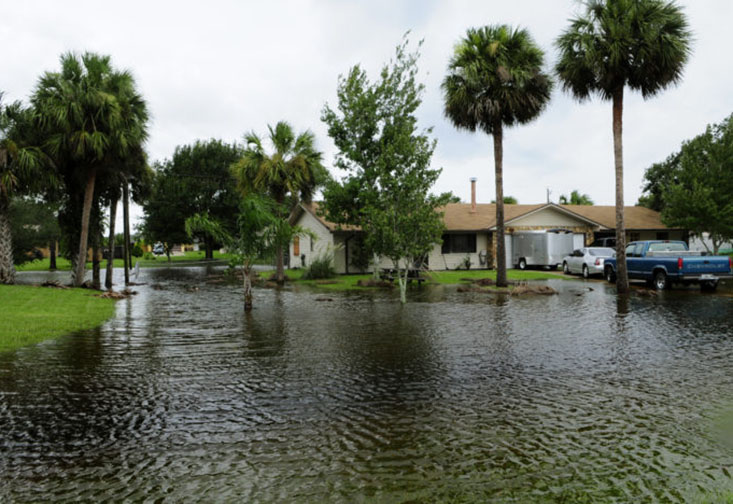St. Petersburg is one of many communities on the front lines of climate change.
Over the next 15 years, sea level rise in St. Pete is expected to increase by 4.68 inches, according to the Army Corps of Engineers. Data compiled by First Street Foundation, a non-profit focused on raising awareness and encouraging action on sea level rise, illustrates how this additional sea level rise will impact the community. Some 9,041 residential properties and 102 commercial properties will be at risk of flooding by 2033 and property owners are projected to lose $208.5 million in real estate resale values if nothing is done to curb climate change.
The City of St. Pete has vowed to tackle climate change, which the United Nations has labelled “the defining issue of our time.” Mayor Rick Kriseman created the Office of Sustainability & Resiliency to develop and deliver sustainable policies and programs. The city was recently selected as a winner of the Bloomberg American Cities Climate Challenge, which included resources and support packages valued at over $2 million to help achieve its sustainability goals.
For its part, USF St. Petersburg is spearheading sustainability projects such as installing solar panels and electrical vehicle charging stations to reduce its carbon footprint. While through its Community Climate Change Education Series, USFSP’s Initiative on Coastal Adaptation and Resilience (iCAR) is aiming to prepare citizens for the sometimes sudden, often insidious impacts of climate change.
On March 5 at 7:00 p.m., iCAR presents Climate Science 101: Real Estate and Climate Change at Boyd Hill Nature Preserve Education Center. Speakers will give presentations and hold Q&A sessions with the goal of helping citizens answer the question, “What will happen to my house?”
“We want to educate the community about the different implications of climate change that we need to be prepared for,” said Dr. Barnali Dixon, Professor of Environmental Science at USFSP and the Executive Director of iCAR. “At this event, we’ll be talking about issues surrounding coastal flooding, insurance and real estate values, because at some point we have to figure this stuff out.”
The event’s speakers include Noah Taylor, Floodplain Coordinator for the City of St. Pete, and Brandi Gabbard, a St. Pete Council Member and Team Leader at Smith and Associates Real Estate. They’ll discuss topics like flood insurance costs, sea level rise projections and the city’s special flood hazard areas.
Notably, in the next year or so the City of St. Pete will release its preliminary flood insurance rate maps, which offer communities insight on their projected risk to flood hazards. These maps will contain changes to some special flood hazard areas. Taylor invites citizens to come discuss the changes at the event.
“People can come and ask questions about these maps during the session,” he said. “And if a flood does happen to their house from climate change, they’ll know how much those repairs are going to be and what sort of things the city is doing to repair them.”
The impact of climate change may seem insignificant today, but everyone will someday be forced to contend with its consequences.
“Everybody will be impacted by climate change” said Dr. Dixon. “Not everybody will be impacted in the same way, but it will have socioeconomic as well as biophysical impacts on everyone.”
Whereas increased flooding might be expected for coastal homes, whose owners have long had flood insurance, many inland neighborhoods will come to experience unusual flooding events. Property owners who never needed flood insurance may be required to carry it.
“What’s important to us is making the public aware of these issues,” Dixon said. “There will be both policy and personal decisions to be made. Whether you’re going to rebuild or raise your house. Or maybe you can retreat further inland, which means the government might buy out low-lying areas and people will move somewhere higher up. There are a lot of costs and decisions involved.”
On April 2, iCAR will continue its Climate Science 101 series with an event titled Updates from the City of St. Petersburg on the American Cities Climate Challenge. At 7:00 p.m., Sharon Wright, Sustainability and Resiliency Director for the Mayor’s Office, will discuss how the City of St. Pete is implementing the support package it received as a Bloomberg ACCC winner.
For more information on the Community Climate Change Education series, contact Dr. Rebecca Johns, Director of Community Education and Outreach for iCAR, at rjohns@mail.usf.edu.
